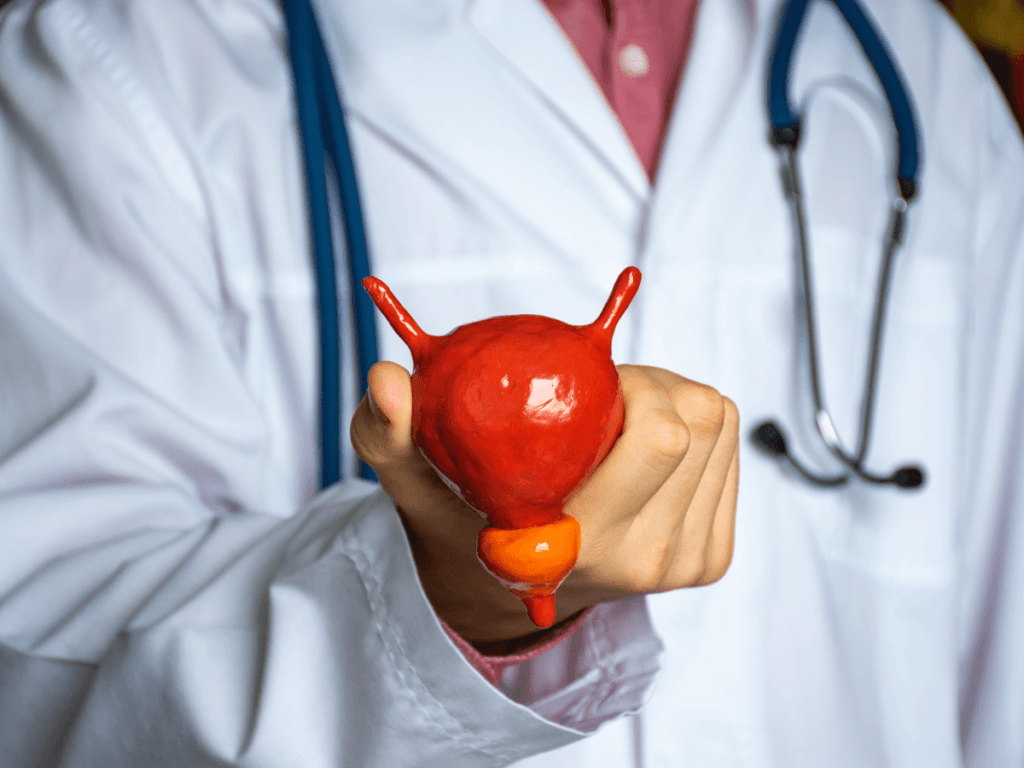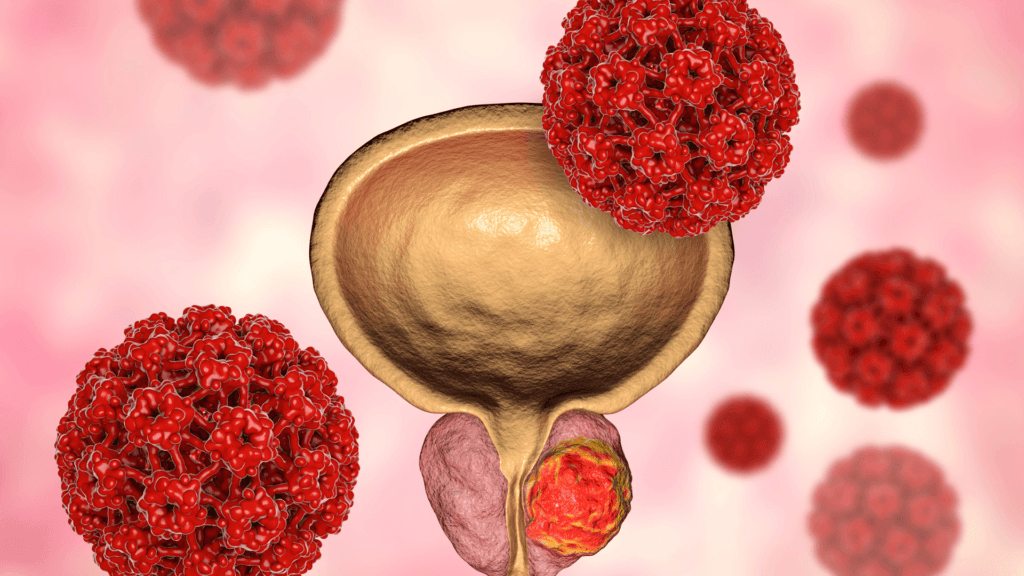So what is prostate health and how can we reduce risks and other prostate health conditions?
Prostate health refers to the well-being and proper functioning of the prostate gland, an important part of the male reproductive system.
The prostate is a small gland located just below the bladder, and it surrounds the urethra, the tube through which urine passes out of the body. It plays a crucial role in the production of semen, which nourishes and transports sperm.
What Is The Prostate
The prostate is a small, walnut-sized gland found in males, situated just below the bladder and in front of the rectum. It encircles the urethra, the tube that carries urine and semen out of the body.
The primary function of the prostate is to produce seminal fluid, which nourishes and transports sperm. It is a crucial part of the male reproductive system.
Addition Information On The Prostate Gland
- Size and Shape: The prostate gland is roughly the size of a walnut or a small kiwi. Its shape is often compared to that of a donut or a chestnut. The size can vary slightly from person to person and can change with age.
- Muscular Contractions: The prostate gland is responsible for the rhythmic contractions that propel the seminal fluid and sperm into the urethra during ejaculation. These contractions are crucial for the transport of sperm during the reproductive process.
- Composition of Prostatic Fluid: The prostatic fluid secreted by the prostate gland is slightly alkaline and milky in appearance. It contains various enzymes, citric acid, and lipids, which are essential for nourishing and protecting sperm on their journey through the female reproductive system.
- Involvement in Urinary Function: The prostate gland’s position around the urethra can sometimes impact urinary function, particularly in cases of an enlarged prostate. The pressure on the urethra can lead to symptoms such as difficulty urinating, a weak urine stream, or the feeling of incomplete bladder emptying.
- Hormonal Regulation: Androgens, particularly testosterone and its byproduct dihydrotestosterone (DHT), play a crucial role in the growth and function of the prostate gland. Changes in hormonal levels, especially during aging, can influence the size and function of the prostate.

Common Prostate Health Conditions
- Benign Prostatic Hyperplasia (BPH): BPH is a non-cancerous condition where the prostate gland enlarges, often causing urinary problems. The enlarged prostate can constrict the urethra, leading to difficulties with urination, such as a weak urinary stream, frequent urination, or the feeling of incomplete bladder emptying.
- Prostatitis: Prostatitis refers to the inflammation or infection of the prostate gland. This condition can cause discomfort or pain in the pelvic area, difficulty urinating, and sometimes flu-like symptoms. It can be chronic or acute, bacterial or non-bacterial in nature, and treatment may vary depending on the specific type.
5 Ways To Reduce A Swollen Prostate <<< - Prostate Cancer: Prostate cancer is one of the most common cancers among men, especially those over the age of 50. It occurs when abnormal cells in the prostate gland grow uncontrollably. In its early stages, prostate cancer may not cause noticeable symptoms, but as it progresses, it can lead to urinary difficulties, erectile dysfunction, and other complications.
- Elevated Prostate-Specific Antigen (PSA): Elevated levels of PSA in the blood can be an indication of prostate issues such as BPH, prostatitis, or prostate cancer. While it is not a specific diagnosis, high PSA levels often prompt further evaluation to determine the underlying cause, which may require additional tests such as a biopsy.
It’s important for men to be aware of the symptoms associated with these conditions and to consult a healthcare professional if they notice any abnormalities or changes in urinary function. Regular check-ups and screenings can help with the early detection and management of prostate health issues.
Keeping The Prostate Healthy
Learning effective ways to keep the prostate healthy is crucial in minimizing prostate health conditions later on in life.
- Balanced Diet: Consuming a diet rich in fruits, vegetables, whole grains, and healthy fats can contribute to overall prostate health. Some studies suggest that a diet high in fruits and vegetables, particularly those containing lycopene (e.g., tomatoes), may be beneficial for prostate health.
- Regular Exercise: Engaging in regular physical activity has been linked to a reduced risk of prostate problems. Exercise can help maintain a healthy weight, regulate hormone levels, and promote overall well-being.
- Adequate Hydration: Drinking plenty of water is crucial for maintaining good prostate health. Staying well-hydrated can help prevent urinary tract infections and promote regular urination, which is essential for flushing out toxins from the body.
- Proper Hygiene: Practicing good hygiene can help prevent the risk of prostate infections. Maintaining clean genital areas and practicing safe sex are important aspects of prostate health.
- Regular Medical Check-ups: Regular check-ups with a healthcare provider are essential, especially for men over the age of 50. Routine screenings, including prostate-specific antigen (PSA) tests and digital rectal exams, can help detect any potential issues early on.
- Limiting Alcohol and Caffeine: Excessive consumption of alcohol and caffeine can irritate the bladder and contribute to urinary problems. Moderation is key when it comes to these beverages for maintaining good prostate health.
- Healthy Lifestyle Choices: Avoiding smoking and maintaining a healthy lifestyle overall can significantly contribute to prostate health. Smoking has been linked to an increased risk of prostate cancer and other prostate-related issues.
By following these tips, individuals can significantly reduce their risk of developing prostate-related problems and promote overall prostate health.

What Is Prostate Health Summary
Prostate health refers to the overall well-being and proper functioning of the prostate gland, a vital component of the male reproductive system. Key aspects of prostate health include the prevention of common conditions such as benign prostatic hyperplasia (BPH), prostatitis, and prostate cancer.
Maintaining a healthy lifestyle, including a balanced diet, regular exercise, and proper hydration, is essential for promoting prostate health. Additionally, routine medical check-ups and screenings, particularly for men over the age of 50, can aid in the early detection and management of any potential prostate issues.
Additionally, routine medical check-ups and screenings, particularly for men over the age of 50, can aid in the early detection and management of any potential prostate issues. Understanding the symptoms associated with prostate conditions and promptly consulting a healthcare professional if any concerns arise is crucial for maintaining optimal prostate health.




